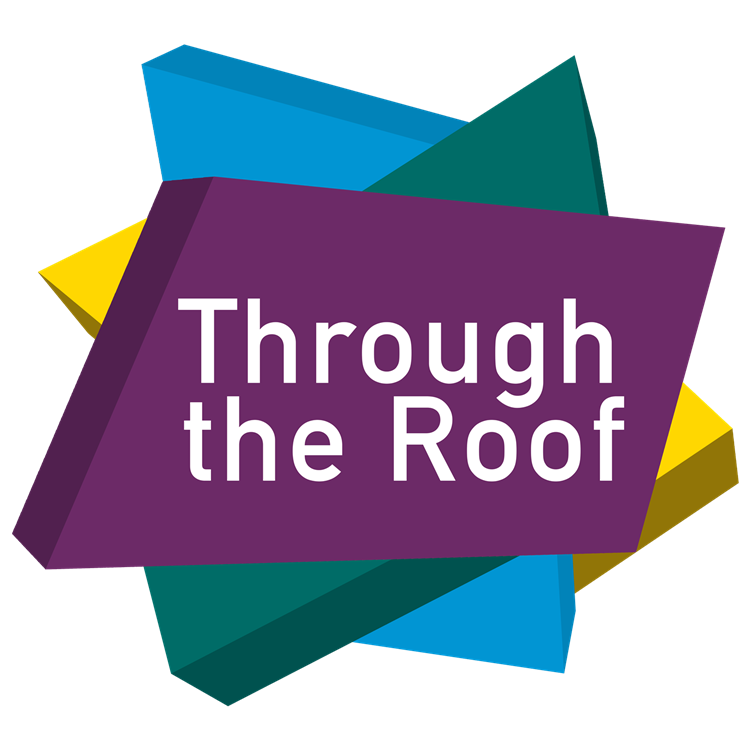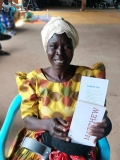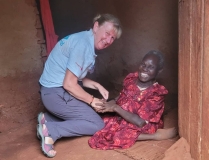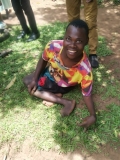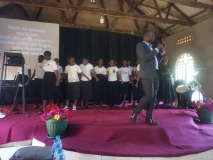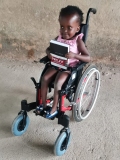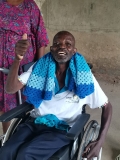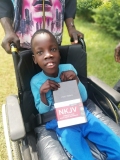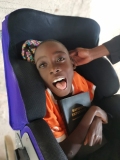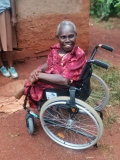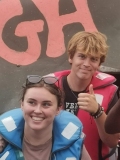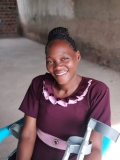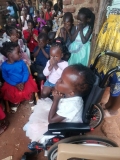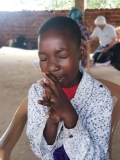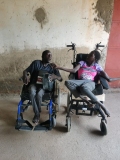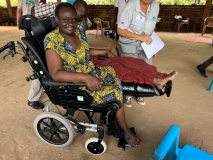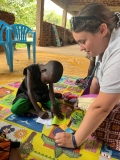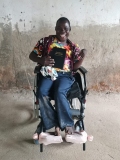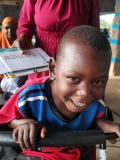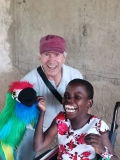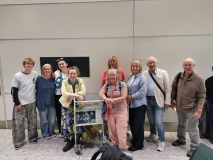News release: Through the Roof Celebrates 1000th Roofbreaker
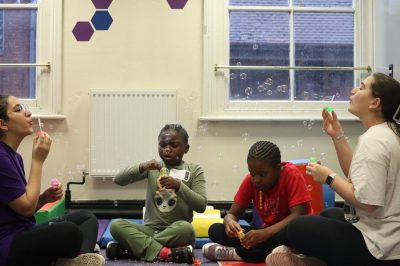
Through the Roof recently registered its 1000th Roofbreaker, and calls on others to join this growing initiative, as we celebrate the UN International Day of Persons with Disabilities on 3rd December 2025.
What is the Roofbreaker movement?
Supported by three years of funding from Benefact Trust, Through the Roof provides resources, training and support to volunteer disability champions – or Roofbreakers (named after the Bible account in Luke 5) – to journey alongside disabled people in UK churches.
Despite the potentially destructive name, the purpose of Roofbreakers is to build up the Church – embracing everyone as made in God's image and enabling disabled people to be fully involved in building God's Kingdom.
Our 1000th Roofbreaker!
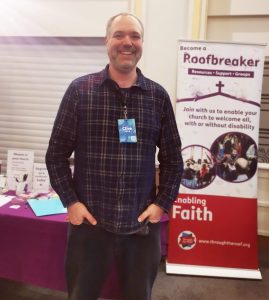 The 1000th Roofbreaker to sign-up was Clive at the FIEC Leaders Conference in Blackpool.
The 1000th Roofbreaker to sign-up was Clive at the FIEC Leaders Conference in Blackpool.
Clive and his wife, Hannah, have a wonderful daughter, Chloe, who is 20 years old, and is a wheelchair-user with a learning disability. Clive said that Chloe has taught him many things in life – the most important of which is that we are ALL made in the image of God.
Clive and Hannah would love to see others in the Church engaging with the subject of disability inclusion, for each to be a community where everyone knows the reality that everyone is made in the image of God and ALL are fearfully and wonderfully made.
('Made in God's Image' was the 2025 theme for Disability Awareness Sunday, which can be celebrated on any Sunday! To access free disability inclusion resource for churches, follow this link to our Disability Awareness Sunday page.)
Transforming the Church
Through the Roof’s Chief Executive, Tim Wood, declared, "It is great to reach this significant milestone, but we can't stop there! We want to see a Roofbreaker in every church. 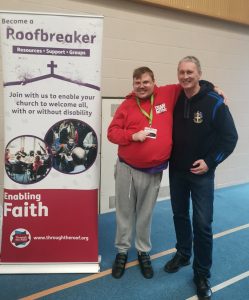 In the UK, the number of young people under 18 is about the same as the number of disabled people. If we think about how much time, resources and energy goes into children and youth ministry and compare that to disability ministry – there's a huge difference! That's why we're so committed to supporting people who want to be ambassadors in their local context".
In the UK, the number of young people under 18 is about the same as the number of disabled people. If we think about how much time, resources and energy goes into children and youth ministry and compare that to disability ministry – there's a huge difference! That's why we're so committed to supporting people who want to be ambassadors in their local context".
Jo Luck, Senior Grants Officer for Benefact Trust, said: “Through the Roof’s Roofbreaker initiative is transforming churches into truly inclusive communities. Reaching 1,000 Roofbreakers is a milestone worth celebrating – it reflects a growing commitment to ensuring disabled people are fully involved in church life. Everybody should feel empowered and have equal opportunities to thrive, and that’s why we feel privileged to support Through the Roof with this vital work.”
Tim concludes, "Through the Roof wants to ensure that we're all reaching out to those who get overlooked, to make sure everyone finds their place in God's family. We want to enable disabled people to use their gifts to disciple others and bless the Church. We'd love more people to join us in making a difference."
Be part of the change
Join 1000+ Roofbreakers so your church can be blessed by the full involvement of disabled people: visit https://www.throughtheroof.org/roofbreakers/ (social media @TTRChangesLives).
More about Through the Roof and Benefact Trust
Through the Roof trains and equips churches and other organisations to be inclusive of people across the whole spectrum of disability. Watch the video ‘Why every church needs a Roofbreaker’ on YouTube (@TTRChangesLives) to find out more.
Benefact Trust is one of the UK's largest grant-making charities and awarded a record £25.5 million to churches, charities, and communities in 2024. Its funds come from its ownership of the Benefact Group – a specialist financial services organisation. Follow Benefact Trust on social media @benefacttrust, or visit their website for more information. 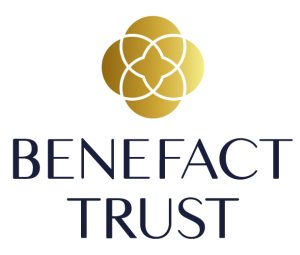
Luke 5 award from Oscar who can access the Bible by himself!
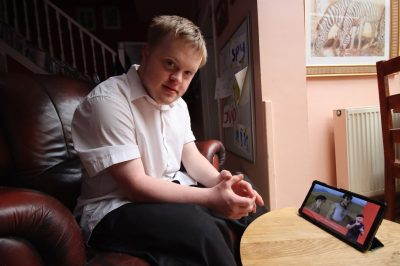
Oscar is a 19-year-old young man with Down Syndrome, who is also Deaf. More importantly, he is a follower of Jesus.
Breaking down barriers
Oscar loves the stories of the Bible, but because he can't hear and is unable to read due to his learning disability, he had never been able to access the Bible by himself. He has always relied on it being read to him and explained to him in British Sign Language.
But now everything has changed… Oscar’s favourite Bible animation series, Superbook, has just been made available with British Sign Language translation!
This is life-changing for Oscar, and to celebrate the difference this has made in Oscar’s life, his mum Karen has helped him to nominate makers of Superbook for a Luke 5 Award for Disability Inclusion. Through the Roof were delighted to give the Luke 5 award from Oscar to Christian Broadcasting Network UK (CBN).
How it all began: lead up to the Luke 5 Award
CBN first piloted one episode of Superbook with BSL interpretation and asked for feedback. Members of Through the Roof’s Deaf Ministry Network gave feedback, and CBN responded magnificently in every possible way. The result is excellent, and Oscar’s mum’s reaction says it all…
“I'm so over-joyed with this - I feel quite tearful!... Oscar is unable to read so cannot access the Bible by himself. He relies on it being read to him and explained. Watching Superbook by himself has helped him to develop his faith and love for Jesus because it is so visual and engaging, causing his knowledge of the truth to grow.”
Karen goes on to say, “I asked him just now ‘Why do you like Superbook?’ He looked up at me and said ‘Because it’s about Jesus. I want to follow Him’ and went back to carrying on watching the episode!”
CBN's response: more translation and a video!
CBN were delighted with the Luke 5 award from Oscar, and very touched by his story. Luke Hancorn, Director of Mission Advancement at CBN, said:
“On behalf of the entire team here at CBN UK, I want to extend our heartfelt thanks for nominating Superbook for a Luke 5 Award. What an incredible encouragement it was to receive your message!”
“Reading Oscar’s story truly moved us, it touched every heart on our team. We feel so blessed and inspired to hear how Superbook in British Sign Language has played such a powerful role in his journey with Jesus. Stories like this are exactly why we do what we do.”
“We’re excited to share that we’re about to begin translation of Season 2 into British Sign Language – a milestone we’re celebrating with great joy.”
CBN were so thrilled that they made this fantastic video with Oscar and his Mum! Watch it now to hear from Oscar himself the difference BSL makes.
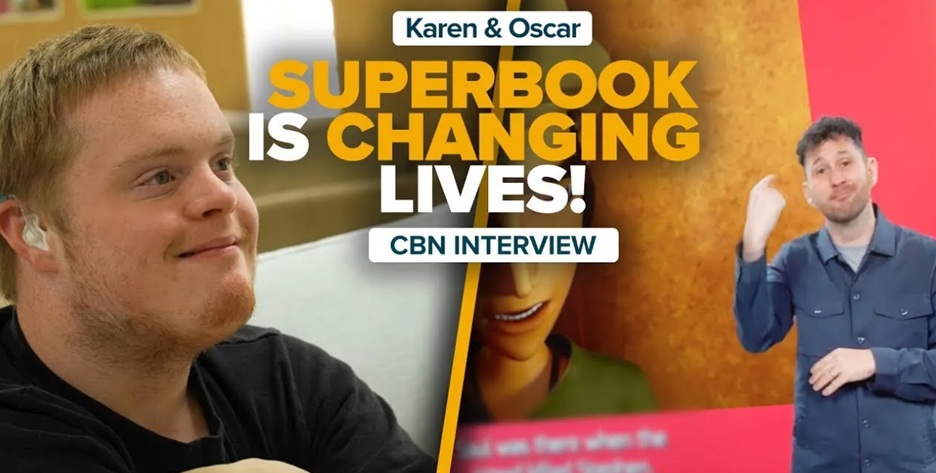
You can watch all of Series 1 of Superbook in BSL on YouTube @SuperbookUK. To find out more about the series, visit: www.superbook.uk
Please pray and advocate for all media to be made accessible to people with hearing loss – and other impairments – so that all have equal access.
If you'd like to be an advocate for disabled people in church, or just show that you're positive about disability inclusion, please consider becoming a Roofbreaker disability champion in your church or community.
If you are a disabled person who wants to celebrate a person or ministry that has supported you to be included more fully in Christian life, consider a nomination for the Luke 5 Award for disability inclusion.
Winter 2025 Vital Link Newsletter: When Hope Rolls In
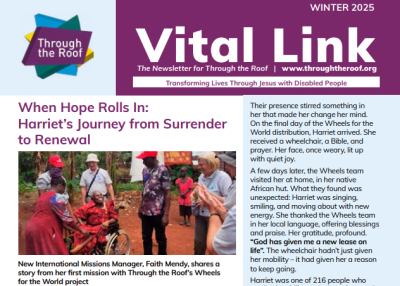
Welcome to the Winter 2025 Vital Link newsletter from Through the Roof.
Our 2025 series concludes, exploring the Disability Awareness Sunday theme: 'Made in God's Image'.
This issue, we focus on the final keyword in our 2025 theme: 'Image'. So, as we prepare for Advent, we remember how God came down to Earth, bearing a human image, in Jesus.
- Hear how Harriet in Uganda had her self-image restored by hope
- See Deaf priest Neil Robinson preach in sign language (BSL)
- Be reminded that it's never too late to celebrate Disability Awareness Sunday!
- Meet our new staff member, Revd Faith Mendy, and new trustee, Amanda Say
- Read our Chair of Trustees share how God 'looks at the heart', not our 'image'
- Reflect on finding hope through disappointment, from our in-person retreat
- Hear about TTR holidays, retreats & events, including our Jan. '26 virtual pilgrimage
- Read author Emily Owen's final thought in the series on being 'made in God's Image'
- And get all the latest International Mission updates - including a recipe request!
Download your PDF copy (with alt text and reading order, to support screen-reader use).
Note: There have been updates to dates for two Upcoming Wheels for the World trips, so the dates in the PDF are now revised to:
- Dates: 20th–29th May 2026, Destination: Ghana (Accra), Partner: Royal House Chapel International.
- Dates: 26th August–5th September 2026, Destination: Rwanda (Kayonza & Kamonyi), Partner: FoH Rwanda.
All other trips and events are still as per the dates in the Winter 2025 Vital Link PDF.
Please email Kathy Birch Kathy@throughtheroof.org to apply or get more information.
Alternative formats
Vital Link is available in many different, accessible formats:
- large print, Word file, braille, audio link, CD.
Contact us on 01372 749955 or email info@throughtheroof.org to request one of the above accessible formats.
- As above, there is the PDF with alt text and adjusted reading order
- Or read Vital Link onscreen with the Joomag viewer below:
When hope rolls in: Wheels for the World in Jinja, Uganda
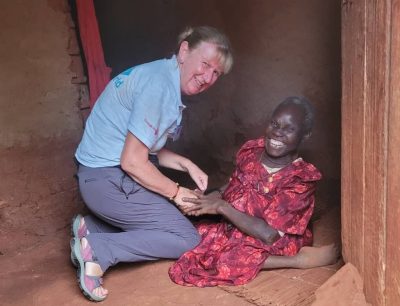
In September 2025, our Wheels for the World team travelled to Jinja, Uganda, bringing mobility, dignity, and the love of Christ to over 250 individuals. Each day was filled with unforgettable moments of transformation and hope.
Faith Mendy, Though the Roof's International Missions Manager, shares how God brought 'hope on wheels' to disabled people in Uganda. Working with local charity partner, Petra Foundation Christ Ministries, many lives were transformed by gifting wheelchairs and Bibles.
Harriet's journey from surrender to renewal
In a modest church in Jinja, Uganda, a woman named Harriet sat quietly among the congregation. At 70 years old, she had lived with the effects of polio since childhood. Her mobility was limited, and the years had been hard. Though surrounded by children and grandchildren, Harriet had recently fallen ill and felt her strength fading. She believed her time had come.
From Harriet’s viewpoint, sat in her new wheelchair...
I came to church that Sunday with a quiet heart. At seventy, after living with polio since childhood and falling ill again, I felt my strength fading. Surrounded by family, I wasn’t afraid—I was simply ready. I wanted to dedicate my life to Christ, to prepare for what I believed was the end.
When the pastor mentioned a wheelchair distribution, I gently declined. What use is a wheelchair now? I thought. I’m ready to go.
But the following week, something changed. I met the Wheels for the World team—strangers who spoke with such warmth and welcoming, it stirred something inside me. Why do they care so much? I wondered. Their kindness made me reconsider.
That last day of the distribution I thought to myself that morning. Get yourself together and go, what do you have to lose. I went with a bit of dread, I received a wheelchair, a Bible, and a prayer. As I sat in that chair, I thought to myself, maybe I’m not done yet.
Days later, they visited me at home. I sang my heart out and danced, sitting on the wheelchair to honour them for how they had given me hope. I thanked them in my language, my heart was full and I will carry them in my heart forever: “God has given me a new lease on life.”
Please pray: for Harriet, and all those who received mobility and the Gospel on the 2025 Jinja Wheels for the World mission.
Carol Dyer, who was our UK team leader in Jinja, shares stories of other lives transformed by the gift of hope...
Favour’s Story: A Little Girl with Big Courage
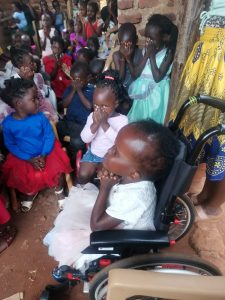 On Day 2, we met five-year-old Favour, who lives with Spina Bifida. Her quiet strength moved everyone. With determination, she climbed into her new wheelchair—step by step, foot by foot—until she sat upright, beaming with pride. The crowd erupted in applause.
On Day 2, we met five-year-old Favour, who lives with Spina Bifida. Her quiet strength moved everyone. With determination, she climbed into her new wheelchair—step by step, foot by foot—until she sat upright, beaming with pride. The crowd erupted in applause.
The next day, Favour joined Sunday school for the first time, clapping and singing joyfully. “Her courage was contagious.” Her story reminds us that every child deserves a place in the house of God.
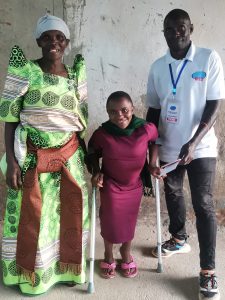
Zeresi’s Journey: From Disappointment to Independence
Three years ago, Zeresi, then 14, was denied a wheelchair and given crutches instead. Leonard, a disabled volunteer, explained that using her legs would strengthen them. She returned this year transformed—stronger, mobile, and attending school. “Thanks to Leonard’s wise words, Zeresi is now a happy and much more mobile young lady.”
Christine’s Testimony: Faith in the Face of Trauma
Christine, a schoolteacher, was brutally attacked and left disabled. Despite years of pain, she radiates faith. We adapted a wheelchair for her, and prayed together. “Christine knows and loves God and she radiates Jesus.”
Why Support Matters
- “All went home in a wheelchair or crutches—with God’s word in their hands.”
- “It is in His strength that we serve.”
- “Receiving a wheelchair will help them work and be part of their community.”
- “Her presence showed us how vital it is to create spaces that welcome those with disabilities.”
Your donations and time can change lives. Will you join us?
Your prayers and support are vital
Online talk: Learning Disability and the Body of Christ

What if church was a place where everyone, of every ability, could give and receive as part of one beautiful Body?
Hear about one community’s journey toward belonging and mutuality, with practical insight into how total communication practices can create space for every voice. Through the stories of an adult and a child with learning disabilities, we’ll explore what this vision looks like in practice—and how you can begin building more inclusive, connected communities in your church.
'Learning Disability and the Body of Christ: A Journey for All Ages'
A recorded online talk (40 minutes)
Speaker: Vitoria Schoeps, a Roofbreaker disability champion, shared the journey she and her church community in Swindon have been on.
Listen to the talk online: Follow this link to hear Vitoria's talk
This talk will inspire churches and ministries with a passion for making church accessible to people with additional needs, using signs, symbols and sensory input, to explore and grow in faith together.

We are launching an Learning Disability Roofbreaker network—a space to connect, share resources, and support one another. We've seen a growing number of people who share a passion for learning disability inclusion—through personal experience, family life, ministry, or community work. Whether you are well along the road, or just beginning the journey, join us to connect and share experience and support. We'd love to hear your ideas on what would be most helpful in your context.
Here are a few possibilities we’re considering:
- Regular online events with a resourcing/training focus
- A WhatsApp group for encouragement and support
- An online platform for sharing everyday resources
- Connection with a small group of “buddies” working in similar contexts or regions
- In-person events (either formal awareness-raising or informal catch-ups)
Listen to the recording of Vitoria's talk and join us in our new Learning Disability Roofbreaker network to help shape the future of this exciting way to do church.
👉 Listen online here: Follow this link to hear Vitoria's talk
God bless
Katie and the Roofbreaker Team
Together on Pilgrimage The Windows of the Soul virtual retreat
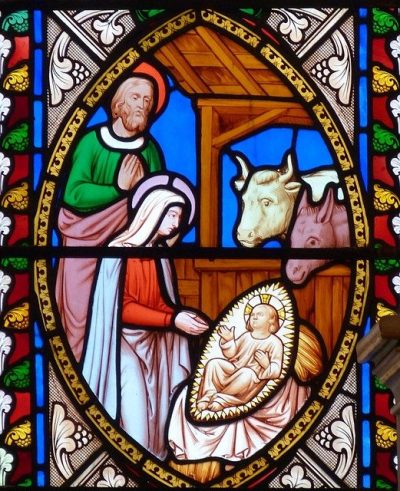
As we go into the New Year, you are invited to join a Virtual Pilgrimage The Windows of the Soul, on 19th – 23rd January 2026. Using the imagery of church windows, it will be an opportunity to retreat into yourself and reflect on the following:
- To the North, you are invited to reflect on the key values in your life.
- To the West, what is dying off or should be let go.
- To the South, the things that give joy and sustain you.
- To the East, the things that are new and developing.
Sign-up for this special journey on Zoom on Mon, Wed and Fri afternoons, 2-4pm on 19th, 21st and 23rd January 2026, Email: together@throughtheroof.org to register, or express your interest on the form below.
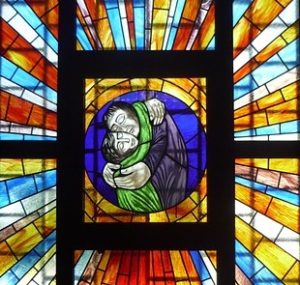
This virtual Pilgrimage The Windows of the Soul will be led on Zoom by David Smith, a former physiotherapist, whose mobility was affected after a stroke.
Previously a keen walker and cyclist, David became interested in pilgrimage and initiated Bible-based virtual spiritual journeys, to bless those with restricted movement.
Find out more about David's virtual pilgrimages at: https://pilgrimageoftheword.org.uk/
Complete this contact form to register interest in the Virtual Pilgrimage: The Windows of the Soul, or email together@throughtheroof.org :
About Through the Roof's groups, retreats and holidays
Through the Roof (TTR) offers accessible, supported retreats and group events, as well as online small groups, as times of fellowship for disabled people and for all, in an atmosphere of joy and togetherness. These are opportunities to be refreshed spiritually through reflection, meeting with others and spending time being refreshed.
Find out more about Through the Roof retreats and holidays, visit https://throughtheroof.org/holidays-and-retreats/
Find out more about Through the Roof's regular online afternoon fellowship groups: Together in the Lounge, monthly on Tuesdays; and Together at Home, twice monthly on Thursdays.
If you would like to find out more or join us for any of our other online groups or in-person events, please do email us at together@throughtheroof.org
Hope Through the Roof: Transforming Lives in Rwanda

In August 2025, a series of powerful events unfolded, transforming lives in Rwanda as part of the Roofbreaker initiative from Through the Roof, in partnership with a local charity FoH in Rwanda. These gatherings—in Kamonyi and Kayonza Districts—brought together parents, pastors, community leaders, and disabled people to share stories, learn, and build a more inclusive future.
Breaking Barriers in Kamonyi
The Roofbreaker training in Kamonyi opened with heartfelt prayers and a clear mission: to equip local leaders with the tools and compassion needed to support people with disabilities. Pastor Davis and his wife Ruth shared the biblical inspiration behind Through the Roof, reminding participants of the story where friends lowered a paralysed man through a roof to reach Jesus—a symbol of determination and love.
Participants formed discussion groups to tackle pressing questions:
- Cultural taboos: Families often hide children with disabilities due to shame. Churches and communities must challenge these beliefs and promote dignity and inclusion.
- Legal protections: Rwanda’s National Council of Persons with Disabilities (NCPD) was praised for its grassroots structure and commitment to rights.
- Church inclusion: Churches were urged to count, include, and empower people with disabilities—especially through sign language training and inclusive projects.
- Self-reliance: Co-operatives and vocational training were highlighted as key to reducing dependence on foreign aid.
The day ended with sign language lessons and a message of compassion from Pastor Jacques, reinforcing the importance of seeing every person as valuable.
Parent Workshops: Stories of Strength and Faith
The parent workshops in Kamonyi and Kayonza were filled with emotion, testimony, and transformation. Though planned for a modest number, attendance surged—proof of the deep hunger for hope and connection.
One father, Bizimana Alex, shared how his child crawled until age four due to a disability. Despite the challenges, he spoke with pride and love, urging other parents to embrace their children fully.
Nirere Vestine, a mother born with a disability, recounted her journey through trauma, motherhood, and resilience. Her child was also born with a disability, yet she expressed profound gratitude for life and the strength she found in the workshop community.
Nyirahabimana Adeline, a visually impaired woman, received an audio Bible and shared how she had long struggled to access God’s Word. “This marks the beginning of a new chapter in my life,” she said, her joy palpable.
Umuhoza Aline, a 14-year-old with low vision, had dreamed of owning an audio Bible. Her parents couldn’t afford one, but thanks to the training, she finally received it. “Now I can grow in my knowledge of God’s Word,” she said with a smile.
Other parents—like Sophia, Ruth, and Marie—who couldn’t read or write, expressed joy at being able to hear Scripture for the first time. “Now our ears will hear what God’s Word says,” they said.
Empowerment and Legacy in Kayonza
In Kayonza, the focus shifted to legacy and empowerment. Pastor Davis challenged participants to think beyond material inheritance and consider lives they impact. Groups discussed how to:
- Economically empower people with disabilities through education and vocational training.
- Support visible disabilities with tailored assistance and protection.
- Build relationships by changing attitudes and avoiding harmful language.
- Fight exclusion by making churches accessible and welcoming.
- Create lasting impact through education, inclusion, and advocacy.

The stories of Christella Shenga (who has a hearing impairment) and Simon Kwizera (physically disabled) stood out. Christella was thrilled to receive a Bible and committed to encouraging others like her. Simon, denied education by his family, found hope in the audio Bible and shared his desire to grow spiritually.
The Chairperson of Rwanda Interfaith Churches was so moved that he donated two pigs to support people with disabilities and called for more regular training sessions.
A Movement of Hope
These events were more than workshops—they were a movement of hope, inclusion, and transformation. Audio and printed Bibles were distributed, sign language was taught, and meals were shared. Most importantly, hearts were changed.
As one participant said, “This training has changed our mindset. We now see our children not as burdens, but as blessings.”
If you want to inspire hope and change hearts and minds towards disability inclusion overseas, then please consider giving, volunteering or praying to support our International Roofbreaker events.
Pray for Disability Awareness Sunday

Can you join us in prayer?
We invite you to join us to pray for disability inclusion and all the churches who registered to take part in Disability Awareness Sunday.
Many churches in the UK and around the world have been holding services and events to celebrate disabled people in church and Christian life: either on Disability Awareness Sunday itself, 28th September 2025, or on a different day.
We want to cover these churches and their Disability Awareness events in prayer and we’d love you to pray with us.
The prayer continues, following on from a 24-hour prayer chain which took place from 12 noon (UK time) on 27th Sept till 12 noon on 28th Sept 2025. Our Together at Home group produced a main DAS 25 Prayer Guide with ideas for prayer, as well as some shorter and longer prayer guidance (see below).
Prayer is still much needed! Only God can transform our churches to be more fully inclusive of disabled people.
How do I join in?
We asked people to sign up for a slot to pray, so that we could try to fill any gaps. Now, after the official Sunday, you can pray any time! But it's still really important.
The original event was set up through the organisation '24/7 prayer', who run the Global Week of prayer each September. We just used the same sign up sheet to pray for Disability Awareness Sunday.
Anyone can pray any time, anywhere!
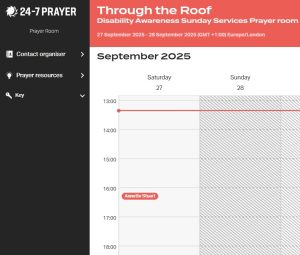
Resources and prayer prompts
We provided short prayer prompts (see bullet points below) as well as longer prayer resources:
1. A main DAS 25 Prayer Guide produced by our Together at Home fellowship group (find out more about Together at Home here)
2. A longer prayer exercise in Lectio365-style, also produced by the Together at Home fellowship.
Some short prompts are in the bullet points below. The prompts and resources should have been sent by email to everyone who signed up to pray. But you can access them at the links above.
You do not have to use the prompts or resources – they are just a guide.
- Pray for churches/people taking part in Disability Awareness Sunday, that God will bless and encourage them to celebrate and fully include disabled people.
- Pray for the Biblical message to be shared that we are ‘Made in God’s Image’ (Genesis 1), which is the theme for Disability Awareness Sunday 2025.
- Pray for Christians reach out and include disabled people on Disability Awareness Sunday, and to actively work towards disability inclusion as an essential ministry.
***************************************************************************
Frequently Asked Questions (FAQs)
What is Disability Awareness Sunday?
Disability Awareness Sunday is a day to celebrate and ensure disabled people are fully included in church and Christian life. This year it is on Sunday 28th September 2025.
Every year, our charity Through the Roof suggests a theme for Disability Awareness Sunday and produces a free resource for churches and ministries. You can access this year’s free resource at: https://throughtheroof.org/forchurches/disability-awareness-sunday/
Why pray for Disability Awareness Sunday?
Disability inclusion is not an ‘add-on’ to the Gospel, it IS part of the Gospel.
Jesus called disabled people and asks others to do the same in Luke 14’s parable of the Great Banquet, where the Bible says:
“Go out quickly into the streets and lanes of the town. Bring in those who are poor. Also bring those who can’t see or walk.” (NIrV)
All people, including disabled people, are made in God’s image, and are part of God’s plan. A church without disabled people is an incomplete church. So praying for Disability Awareness Sunday is a first step to more and more churches fully including disabled people.
What are we praying for?
For churches and communities who take part in Disability Awareness Sunday: a day to celebrate and ensure disabled people are fully included in church and Christian life. This year it was officially on Sunday 28th September 2025, but any (Sun)day can be Disability Awareness Sunday!
- We pray for churches and people taking part in Disability Awareness Sunday, that God will bless and encourage congregations to celebrate and fully include disabled people.
- We also pray for the Biblical message to be shared that we are all made in God's image. The theme for Disability Awareness Sunday 2025 is ‘Made in God’s Image’.
- The most important thing about Disability Awareness Sunday is that Christians reach out and include disabled people. And that churches continue to actively work towards disability inclusion – e.g. by nominating a Roofbreaker or disability champion in their church.
There are longer prayer resources at the links below with more ideas and prompts on how you could spend your DAS prayer time:
1. A main DAS 25 Prayer Guide produced by our Together at Home fellowship group
2. A longer prayer exercise in Lectio365-style, also produced by the Together at Home fellowship.
You do not have to use the prompts or resources – they are just a guide.
When are we praying?
In the original prayer vigil, people prayed in the 24 hours from 12 noon (UK time) Saturday 27th September, till 12 noon on 28th September 2025. But now you can pray any time!
This 24 hour period was chosen so we were praying before and during the official Disability Awareness Sunday period.
Do I have to pray for a whole hour?
No, even on the 24-hour prayer vigil, you could sign up for the same one-hour slot as someone else, if you agree to do 30 mins each.
We just encouraged people to choose a slot not yet filled, so we cover all 24 hours. And it is fine to sign up for more than one slot, if you can!
The hope was to have every slot filled, so we cover the event in prayer for 24 hours!
How do I scroll up and down in the prayer signup sheet?
There is no prayer sign up sheet now, but for next year, if we use the same 24/7 prayer sign up sheet, here are the instructions:
You use your mouse (or swipe with your finger) to scroll down the prayer sign up sheet. There is no scroll bar at the side, but you can move down the sheet by clicking and dragging with your mouse (or with your finger on a phone/tablet).
How do I select a time slot?
Just click the box between the times you want to pray – by using your mouse or tapping with your finger on a phone/tablet.
Do I have to put my name publicly on the list?
No, you can sign up anonymously. Just click ‘Book anonymously’ in the box when you register.
You will be asked to give an email address so we can send you information, but that is kept private and won’t be shared by the organisers. You do not have to create an account, as you can ‘Book as guest’.
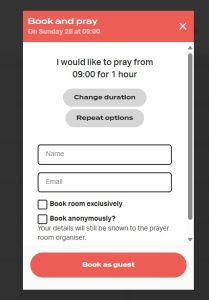
Is there a virtual prayer room on Zoom/video chat?
No, we have decided to invite people to pray independently, without the need to login to a video chat or Zoom room. However, individuals are welcome to set up their own virtual or in-person prayer rooms, if they want to pray together.
I have a different question about the DAS day of prayer – who do I ask?
The easiest way to ask a question is to email annette@throughtheroof.org
What is the Together at Home fellowship group, and can I join?
We would love new members of our online Together at Home Fellowship group, which is a virtual home group for Christians who meet on Thursday afternoons at least once every two weeks, 2-3pm UK time, to share community and pray or read the Bible together. Many of the group have lived experience of disability, but it is open to all.
Please visit our Together and Home webpage for more details and email together@throughtheroof.org to request the Zoom link for future meetings.
How do I find out more about Through the Roof and church disability inclusion?
Please do fill in this short form to Get Updates from us at Through the Roof, the Christian disability inclusion charity.
Let us know on the form if you'd like information from Through the Roof about:
- Groups, holidays and retreats with our Together Fellowship (online or in-person)
- Becoming a Roofbreaker disability champion in your church
- International Missions to support disabled people Africa and Asia
- Our Through the Roof newsletters and weekly prayer emails
News release: Three generations go to Uganda

Carol Dyer from Gosport is preparing for an extraordinary journey this September, travelling with her 18-year-old son Caleb and her 81-year-old father Neil Salter to Jinja, Uganda, with us as Christian disability charity Through the Roof. They are going on a mission for our Wheels for the World project which provides life-changing wheelchairs to disabled people who otherwise have no access to them – restoring dignity, independence, and hope.
Different roles on the mission
The family of volunteers will be working alongside a team of physiotherapists, occupational therapists, mechanics, pastoral carers, and administrators later this September. Together, they will select and fit refurbished wheelchairs for children and adults in desperate need.
Three generations go to Uganda this year, all from one family. It is Caleb’s first trip, taking the role of blogger and photographer; where for grandfather Neil, it’s one of seven trips he’s made with charity Through the Roof, as a volunteer mechanic. Mum/daughter Carol, who is on the staff team of the charity, is the Team Leader for this trip. She is excited to return to Africa on the pastoral team for her fifth mission, Carol shares:
“I get the best job, chatting to the disabled people given wheelchairs and telling them they are ‘fearfully and wonderfully made by God’ (Psalm 139). Often they do not know that. They are normally left at home, not going out to work or school. They arrive crawling or carried; a wheelchair brings them freedom.”
Why take wheelchairs to Uganda?
Globally, over 100 million people need a wheelchair but do not have one – with over 90% living in Africa or Asia. In contrast, thousands of wheelchairs in the UK end up in landfill each year. Through the Roof refurbishes these chairs and ships them to countries where they can make an immediate, life-changing difference.
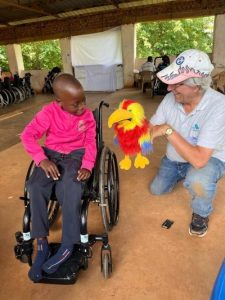
For many in Uganda, the cost of a wheelchair is far beyond reach. Without one, people may be forced to crawl on the ground or be carried everywhere. The gift of a wheelchair opens doors – to education, employment, and full inclusion in community life.
Hear how lives are being transformed
On the last Wheels for the World trip to Jinja, the team met Winnie, a teenager with cerebral palsy who had never moved independently. Her new, customised wheelchair gave her posture support, comfort, and – for the first time – freedom to explore on her own. As she tried her chair for the first time, the crowd erupted into applause and she beamed with joy. Alongside the chair, she was given a Bible in her own language and prayed for, as the team encouraged her to know her value and God’s love.
Tim Wood, CEO of Through the Roof, said: “Our Wheels for the World project transforms the lives, physically and spiritually, of 800 disabled people every year. We’ve got a great community here, and we’d love for more people to join us in transforming lives.”
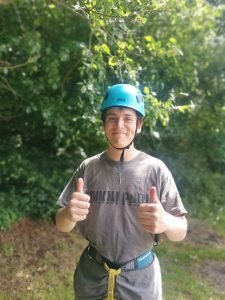
Through the Roof invites supporters to help by donating, volunteering, or spreading the word. Watch our project video at https://youtu.be/7kQSS2v5GxA, see mission updates on social media @TTRChangesLives, or visit our Wheels for the World webpage at https://throughtheroof.org/international-mission/wheels-for-the-world/
Online talk: Coming alongside people with dementia

We were so blessed by the online talk: Coming alongside people with dementia, by 'Embracing Age', about making your church a great place to grow old.
Paul Crowther, Development Manager from UK charity 'Embracing Age' shared practical tips and insights about support for people with dementia, a condition that affects so many.

Alzheimer's Research UK predict that 1 in every 2 people in the UK will be affected by dementia, either as a carer or by having the condition. So it's so important that churches can offer support.
People with dementia experience a range of difficulties including problems with memory, reasoning and language, and changes in their behaviour and emotions. Every individual will be affected differently, and these difficulties will get worse over time.
It is important to remember that people with dementia still have spiritual needs and still need to know that they are accepted and loved. A relationship with God can continue even when rational thought and verbal communication are difficult.
Join with Roofbreaker disability champions in your area and to learn more!
